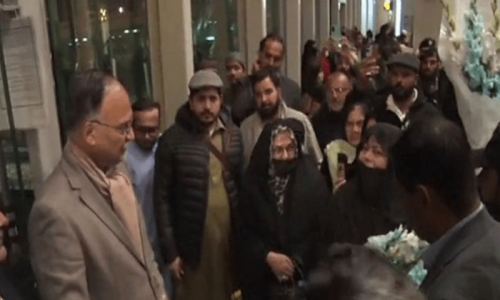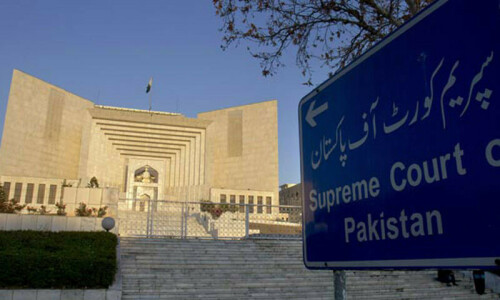
TRIPOLI: Strong explosions rocked Tripoli early Friday as Moamer Qadhafi's shaky regime called for a immediate ceasefire in Libya and rebels claimed control of a key oil refinery not far from the capital.
A slew of explosions were heard around 1:00 am (2300 GMT) in the heart of the seaside capital where Qadhafi's residential complex is located, as well as in several areas in the west of the city.
On Thursday, central Tripoli and the eastern suburb of Tajura were targeted by Nato warplanes, according to witnesses.
Rebels have been seeking to sever Tripoli's supply lines from Tunisia to the west and to Qadhafi's hometown of Sirte in the east in a move they hope will cut off the capital, prompt defections and spark an uprising inside Tripoli.
Opposition forces said Thursday they had seized the refinery in the western town of Zawiyah, a key source of fuel supplies to the capital, and the last major barrier before they advance on Tripoli.
Libyan Prime Minister Baghdadi Mahmudi hotly disputed the claim, saying the refinery was “without doubt” still in loyalists' hands.
Mahmudi told journalists in Tripoli that “the time has arrived for an immediate ceasefire.
“We are ready to begin a dialogue to put an end to the crisis immediately,” Mahmudi added, saying there had been “contact” in recent days to find a political solution in the near future.
A member of the rebels' National Transitional Council (NTC), Wahid Bourchan, said Wednesday that “discussions” and not negotiations did take place this week between some embattled regime members and their rebel challengers in Tunisia.
Former French foreign minister Dominique de Villepin meanwhile told daily Le Parisien he had travelled to the Tunisian resort of Djerba for discussions with unnamed Libyan figures.
“I was indeed there, but I really can't make any comment, as this might compromise the chances of these discussions being successful or useful,” he told the newspaper.
Mahmudi said no negotiations would touch on the fate of Qadhafi, while rebel Chief Mustafa Abdel Jalil was quoted as renewing his side's rejection of any talks that do not envisage the departure from power of the strongman and his sons.
Abdel Jalil was speaking in an interview published in pan-Arab daily Asharq al-Awsat, in which he said the rebel campaign to cut off Tripoli was proceeding apace and that he feared a “veritable bloodbath” in a battle for the capital.
“Qadhafi will not go quietly; he will go amid a catastrophe that will touch him and his family,” he told the newspaper from his eastern bastion of Benghazi.
The Libyan leader, who has ruled the oil-rich North African nation for four decades, has consistently refused to step down and continues to rally his supporters to repel the enemy.
Abdel Jalil said he hoped to celebrate in Tripoli - a city of more than one million inhabitants - the feast of Eid al-Fitr, which will cap the Muslim fasting month of Ramadan at the end of August.
In Zawiyah, some 40 kilometres (25 miles) west of Tripoli, rebels claimed they were in control of “most” of the strategically vital port and had “managed to gain control” of its oil refinery by late Wednesday.
Field commander Mohammed Khalifa was more cautious, saying “freedom fighters” now controlled “most of the city (Zawiyah) except for the eastern part,” from which snipers and mortar fire harried the rebels.
The refinery, the only one in western Libya, is vital to the Qadhafi regime, as it supplies fuel to Tripoli.
Britain's defence ministry said Thursday that Royal Air Force warplanes sank a vessel being used by Qadhafi's forces near Zawiyah.
Further west, another rebel commander, Colonel Ahmed Omar Bani, said that rebels were pushing toward the Tunisian border - an apparent bid to further strangle what limited supply lines remain for Qadhafi's regime.
East of Tripoli, rebels moved toward a town that links the capital and Sirte - Qadhafi's hometown and a stronghold for his military.
On Thursday, the rebels said they had advanced some 80 kilometres south of Misrata on the road to Sirte.
And insurgent fighters claimed to have captured Murzuq, a key communications hub in the desert region of Sabha province, 500 kilometres south of the capital.














































Dear visitor, the comments section is undergoing an overhaul and will return soon.